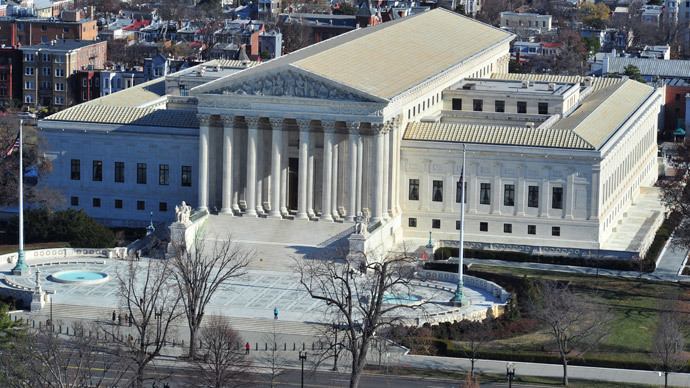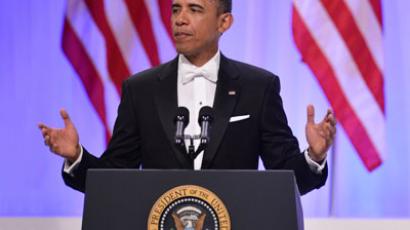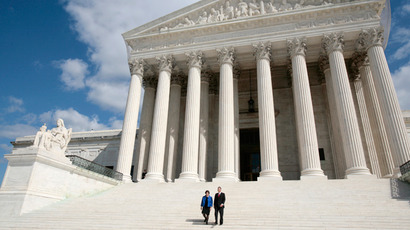Supreme Court strikes down limits on overall campaign contributions

A 5-4 split decision handed down Wednesday morning by the Supreme Court of the United States has invalidated a long-standing law that limited the overall amount of money US citizens can contribute to political campaigns each election cycle.
The landmark ruling in the case of McCutcheon v. Federal Election Commission will not directly impact a law that currently keeps Americans from legally being able to contribute more than $2,600 apiece to individual candidates running for federal office each two-year period. It does, however, erase a so-called “aggregate cap” of $123,200 that up until now prevented people from contributing a combined total of more than $48,600 to the candidates of their choice and $74,000 on parties and Political Action Committees, or PACS, each cycle.
Plaintiff Shaun McCutcheon, a conservative electrical engineer from Alabama, insisted that the limits in place hindered his freedom of speech because it prohibited his ability to donate freely to the politicians he favored. During the last cycle, McCutcheon contributed the symbolically significant amount of $1,776 apiece to a total of 15 right-leaning candidates running for Congress, but FEC restrictions prohibited him from spending much more because signing checks to other candidates would have quickly put him over the aggregate cap.
"It's about freedom of speech and your right to spend your money on as many candidates as you choose. It's a basic freedom," he said ahead of Wednesday’s ruling.
This week’s decision leaves in place the limit of $2,600 applied to contributions made out to individual candidates, but rescinds the threshold that relegated how much money in all can be spent during two-year election cycles, opening the door for people like McCutcheon to be able to write $2,600 checks to as many candidates as they’d wish while allowing them to open their wallets to PACs and parties.
“Hypothetically, a single donor can now contribute as much as $3.5 million, to be divvied up between candidates, PACs, and political parties,” Mother Jones journalist Andy Kroll wrote on Wednesday. “No single entity could receive any more than the legal limits, and when you add up all the contributions a donor could potentially make without the aggregate limits, you get $3.5 million.” According to Reuters, the Public Citizen consumer advocacy group determined ahead of Wednesday’s ruling that erasing aggregate caps first installed in 1974 would actually allow a single donor to spend as much as $5.9 million on a joint fundraising committee controlled by an elected politician or party official.
The non-partisan Center for Responsive Politics claims that almost 1.3 million people donated more than $200 to federal candidates, party committees and PACs last year, but only around 600 Americans hit the maximum donation limit to federal candidates that election year.
"Today, the court made clear that restraints on the political speech of those whose views you don't like must fail," McCutcheon’s lawyer, Dan Backer, said to USA Today early Wednesday. "Free speech is the right of all Americans, and not a revocable grant from the government of the day."
FEC regulations in place ahead of this week’s ruling were established in order to counter any political corruption that may have been spawned by gross overspending by wealthy Americans advocating for issues aligned to certain parties and politicians.
Chief Justice John Roberts wrote for the majority opinion that limits on the total amount of money that donors can contribute to all candidates, committees and political parties are unconstitutional, but the court agreed to leave the ceiling in place that stopped politicians from receiving too much from a single citizen.
"The government has a strong interest, no less critical to our democratic system, in combatting corruption and its appearance," Roberts wrote. "We have, however, held that this interest must be limited to a specific kind of corruption — quid pro quo corruption — in order to ensure that the government's efforts do not have the effect of restricting the First Amendment right of citizens to choose who shall govern them."
The overall limits "intrude without justification on a citizen's ability to exercise 'the most fundamental First Amendment activities,'" Roberts said.
Justice Clarence Thomas was among the five justices who ruled with the majority, but said in a separate memo issued with Wednesday’s decision that he believed the Supreme Court should have scrubbed all contribution limits.
In part, the dissenting justices wrote that the decision “eviscerates our nation's campaign finance laws, leaving a remnant incapable of dealing with the grave problems of democratic legitimacy that those laws were intended to resolve."
"While I understand some base limits on the dollar amount of single contributions, limits to the overall number of candidates, parties and committees are nothing more than unnecessary limits to First Amendment freedom," McCutcheon said in reaction to the ruling. "The Supreme Court has reaffirmed the unconstitutionality of aggregate limits."
House Speaker John Boehner hailed the decision by saying "freedom of speech is being upheld,” POLITICO reported, but Fred Wertheimer, the president of the public interest group Democracy 21, told USA Today that "The court's decisions have empowered a new class of American political oligarchs.”
Together with the SCOTUS decision in the case of Citizens United v FEC that removed boundaries that kept corporations from freely funding PACs. Wertheimer added that “the Supreme Court has turned our representative system of government into a sandbox for America's billionaires and millionaires to play in.”














